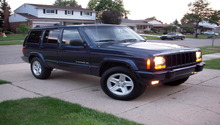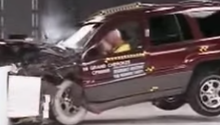Jeep Cherokee 1984-2001: Recalls and Technical Service Bulletins
The 1984-2001 XJ has been involved in a number of recalls and technical service bulletins. Read on to learn if you're due for free recall repairs.
This article applies to the Jeep Cherokee XJ (1984-2001).
The difference between a recall and technical service bulletin is that recall repairs are paid for by the manufacturer, while repairs made as a direct result of a technical service bulletin are paid for by the owner of the vehicle. As well, recall repairs are required for the owner's safety, while technical service bulletins are meant to help the owner's mechanic or local Jeep dealer identify and repair possible nagging (or impending) mechanic problems. Let's take a look at some of the major recalls and technical service bulletins issued for the 1984-2001 Jeep Cherokee.
Biggest Issues
Hood Paint
If the paint on your hood, roof, mirrors and fenders is faded, cracked and generally worn down through no fault of your own, you might be eligible to have your Jeep re-painted at no cost to you. If your Jeep is part of a recall, you'll need to visit a local Jeep dealership for assistance in having the repairs made quickly.

Unexplained Coolant Loss
Unexplained coolant loss is a serious issue that could lead to a cracked cylinder head. If the unexplained coolant loss is accompanied by poor idling, misfires and the presence of the "check engine light" on the dashboard, seek immediate professional assistance. Your vehicle might be part of a recall due to a faulty part.
Other Common Recalls
The 2001 Jeep Cherokee was recalled for a number of exterior lighting problems, including a faulty bumper assembly, service brake issues having to do with a decrease in brake line pressure, and fuel system problems related to a faulty connector. A child seat recall was also issued.

Common Questions
Who should I contact if my Jeep is recalled?
Your local Jeep dealer will contact you with instructions on how to have your vehicle repaired at no cost to you.
Who checks whether my Jeep has been recalled?
Your local Jeep dealer will check your vehicle identification number (VIN) against the system to determine whether your Jeep has, indeed, been named part of a recall.
Will my Jeep lose market value if it's part of a recall?
No. Simply have your Jeep repaired at no cost to you, and continue to follow your general maintenance schedule to the letter.
Common Issues
Bad Transmission
Maintain your transmission by replacing your transmission fluid as it becomes dirty and having your transmission regularly serviced. Symptoms of a bad transmission include gears slipping, dragging clutch and a burning smell. If you experience any of these symptoms, see a certified mechanic immediately.
Engine Rust
Combat rust on your engine block immediately by cleaning the entire surface with an engine cleaner. Failure to do so could lead to major engine failures later on down the line.
Brake Failure
Change your brake fluid as it becomes dirty and swap out your brake pads as they become worn down. For most Jeep owners, it's recommended that you have your brakes inspected every two years, or at the first sign of a problem.
Technical Service Bulletins (TSB)
A number of technical service bulletins have been issued for the 1984-2001 Jeep Cherokee XJ.
- For the 1984 Jeep Cherokee, TSBs for the power train, latches and locks, as well as a floor pan (due to corrosion) were issued.
- For the 1990 Jeep Cherokee, TSBs for the electrical system, seats (a faulty child seat), power train and engine cooling system were issued.
- For the 1995 Jeep Cherokee, TSBs for a number of structural components, as well as the supplemental restraint system were issued.
- For the 2000 Jeep Cherokee, TSBs for the suspension and vehicle speed control system were issued. Previous problems also were once again recalled, including problems related to the power train, electrical system and engine cooling system.
Related Discussion
- XJ Cracked Cylinder Head Information - CherokeeForum.com






